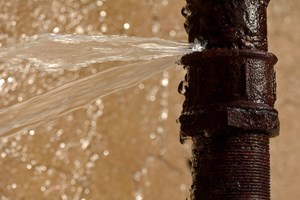Former governors say NJ’s water infrastructure needs major upgrades
(UC) — New Jersey loses about 130 million gallons of treated drinking water daily from leaky pipes, and some of those pipes have not been upgraded since the Civil War, former governors Christine Todd Whitman and James J. Florio said in an editorial for nj.com.

Whitman, who served as governor from 1994 to 2001, and Florio, who served as governor from 1990 to 1994, wrote the editorial to call attention to the state of the unseen infrastructure of New Jersey’s water system and the potential of using $1.2 billion of New Jersey’s share of the American Rescue Plan (ARP) to help fix it.
“We turn the faucet on and water comes out. Water travels down the drain and out of sight. Many of us never think much about it, but there is a whole network of pipes, drains and equipment that is involved in delivering clean water and transporting wastewater and stormwater away,” the editorial states. “These systems only really find their way into focus when we experience a flood or sewage backup, have to purchase bottled water because of lead contamination, or have no service because of water main breaks.”
Many state residents are already dealing with the consequences of the deteriorating water infrastructure, and trouble is around the corner for those who haven’t, the governors wrote.
More than 180,000 New Jersey residents were notified in February that drinking water is coming into their homes through lead pipes, USA Today reported. The American Water Works Association estimates there are 350,000 lead service lines in the state, and the editorial states they will need to be replaced by 2031.
“In some towns, entire drinking water wells have had to be shut down due to contamination from forever chemicals like PFAs, leading to higher water bills. They are called forever chemicals because they stay in the human body forever,” the editorial states.
While the states current administration is making progress on clean water infrastructure, the state faces a nearly $6 billion clean water funding gap over the next five years, they said, noting the ARP provides a rare chance to ensure access to clean drinking water and bolster affordability.
“Additional ARP dollars combined with other sources of funding will have a multiplier effect, enabling the state to leverage it to unlock loans and other mechanisms to finance clean water projects,” the editorial said. “The governor and state legislature have an opportunity to make a bold, life-changing investment in clean water this year. New Jersey cannot afford to wait when it comes to clean water.”
Related News
From Archive

- Glenfarne Alaska LNG targets late-2026 construction start for 807-mile pipeline project
- U.S. water reuse boom to fuel $47 billion in infrastructure spending through 2035
- $2.3 billion approved to construct 236-mile Texas-to-Gulf gas pipeline
- Major water pipe break in Puerto Rico hits over 165,000 customers
- Potomac River Tunnel project enters construction phase beneath Washington, D.C.
- Pennsylvania American Water launches interactive map to identify, replace lead water service lines
- Trump's tariffs drive $33 million cost increase for Cincinnati sewer project
- Utah city launches historic $70 million tunnel project using box jacking under active rail line
- Tulsa residents warned after sewer lines damaged by boring work
- Fatal trench collapse halts sewer construction in Massachusetts; two workers hospitalized



Comments